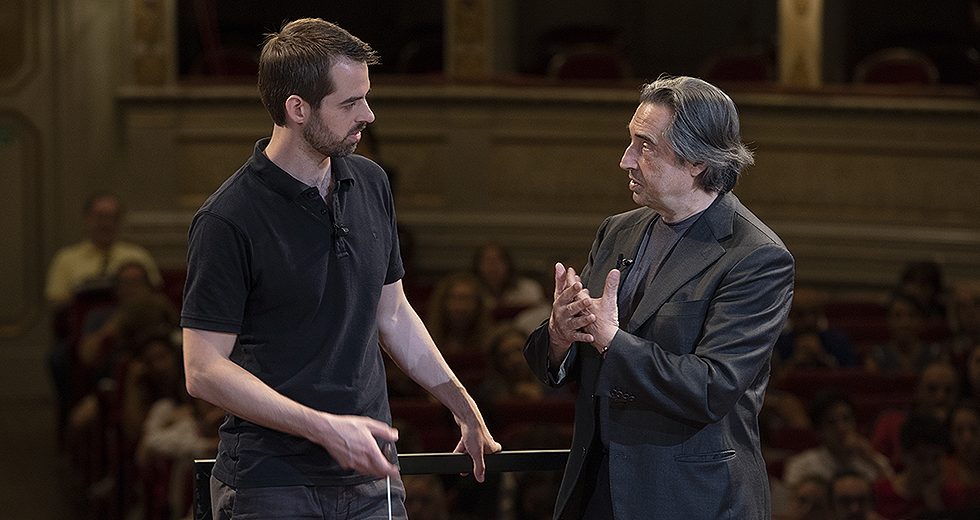
RAVENNA, Italy — It is Day 2 at the fourth Riccardo Muti Italian Opera Academy, and four young conductors are about to take the podium for the first time in front of the Luigi Cherubini Youth Orchestra and a cast of internationally celebrated singers, not to mention Maestro Riccardo Muti himself. The anticipation of this moment is palpable. Over their two weeks at the Academy, they will become immersed in the world of composer Giuseppe Verdi, and specifically, Verdi’s Macbeth with Muti, the world’s pre-eminent Verdi interpreter as their guide. Once they reach the gala concert that marks the finale of the Academy activities on Aug. 3, each conductor will lead selections from Macbeth before an audience.
It’s safe to say that none of these conductors — Alvin Ho of Hong Kong, John Lidfors and Wilbur Lin of the United States, and Aleksandr Poliykov of Ukraine — will ever have an experience quite like this one again. These accomplished young musicians — all under 35 years of age — along with four young pianists selected to be répétiteurs (coaches who prepare opera singers for rehearsals from the piano), and established and emerging professional singers and the young musicians of the Cherubini Youth Orchestra are all there to learn from Maestro Muti. The open and informal setting, where the public can observe Academy rehearsals with Muti and the musicians, sometimes multiple times a day, in the beautiful Alighieri Theater in Ravenna, is unique.
As the next few days unfold at the Academy, Muti embraces his role of “Il Maestro” — the Teacher — and reminds the conductors frequently “non è facile” (“it’s not easy”). Working together, he guides them through selections ranging from the powerful chorus “Patria oppressa,” Lady Macbeth’s sleepwalking scene and the thrilling, complicated sextet with chorus that follows the death of the king by Macbeth and Lady Macbeth and that marks the finale of Act 1. At times, Muti joins the young conductors on the podium, taking them by the arm and leading them in a more refined technique that elicits remarkable results from the orchestra and singers.
How does this level of direct access and coaching from a master conductor, who has led Verdi’s Macbeth dozens of times throughout his illustrious career, impact these musicians? Lidfors notes that “Muti is a Verdi interpreter of deep inspiration and imagination. He uncovers the dramatic meaning of every note of in Verdi’s Macbeth and draws musical atmospheres out of the score that I hadn’t previously heard.”
Lin says, “Getting to know Maestro Muti’s thought process in approaching musical works, whether it’s about interpretation or conducting technique, shines a light into his conducting method. This, along with getting to know Verdi from the most qualified Verdi interpreter, is the most valuable experience so far.”
Ho, who at 25 is the youngest conductor in the group, remarks that “learning from Maestro Muti, who is profoundly connected to the works of Verdi, is an incredible experience. He passes to us his thoughts on every note, word and their nuances in the hope that we can uphold the long line of Italian [opera] tradition. I cannot be more thankful for this experience.”
Poliykov, also a gifted pianist and pedagogue, adds, “The Opera Academy is the ultimate place to learn how to approach, interpret and perform music in the most profound, expressive and honest way. It is a tremendous joy and honor to be invited for the journey deep into the score of a masterpiece like Macbeth, and to experience its darkest details together with the audience through a passionate guidance of Maestro Muti.”
Zell Music Director Riccardo Muti, who has already led the Chicago Symphony Orchestra and Chorus in critically hailed performances of Verdi’s Macbeth, Otello and Falstaff since 2010 (and who will lead Verdi’s Aida with an all-star roster of soloists in June at Symphony Center), appears energized by his work with the young musicians at the Academy. Since founding the Academy in 2015, Muti has remained committed to a certain ideal. He hopes “to entrust those who will come after me with what I have learned from those who came before me,” he says. “From my teacher Antonino Votto, and through him, Arturo Toscanini, who, in his turn, was the direct heir of Verdi’s legacy.”
For opera lovers around the world, the young pupils of Muti’s Italian Opera Academy represent the possibility of insightful and powerful interpretations of Verdi’s opera masterworks for years to come. This is an artistic legacy worthy of celebration. More information about the Riccardo Muti Italian Opera Academy is available at riccardomutioperacademy.com.
TOP: Riccardo Muti offers guidance to student conductor John Lidfors during a session at the Italian Opera Academy in Ravenna. | ©Silvia Lelli
Eileen Chambers is communications and PR officer for the Chicago Symphony Orchestra.




